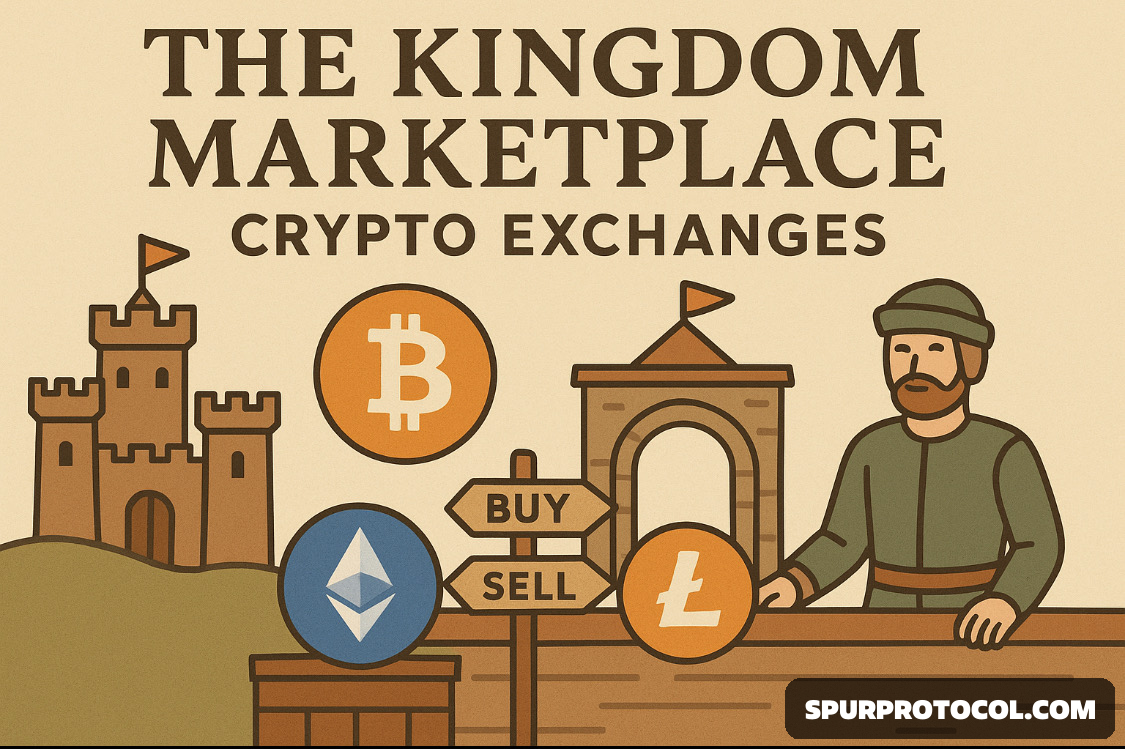The Kingdom Marketplace: Crypto Exchanges
Imagine a kingdom where every week, villagers gather at the marketplace to trade. They bring grain, wool, and coins and exchange them for what they needed. The marketplace is where trade happens.
Go Back

🕒 5:40 AM
📅 Sep 11, 2025
✍️ By ebedee
Today, in the world of crypto, exchanges are those marketplaces. But not all marketplaces are the same. In some, the King's guards watch every trade. In others, the villagers trade freely without anyone in charge. Some trades happen quietly between two people. And some dealt not in goods, but betting on the future. In the world of crypto, these marketplaces are called EXCHANGES as they work in the same way.
The first kind is the King's Market: the Centralized Exchange (CEX). Here, the gates are guarded, the rules are strict, and the King's men hold your coins before you can trade. It feels safe, easy, and familiar. But the King controls everything.
Like a busy town square, everything is being watched and monitored by authority. The King could change the rules... or keep your gold if he wished. Examples: Binance, Coinbase, Kraken. These are run by companies, with accounts, ID checks, and custody of your coins.
The second kind is the Village Square: Decentralized Exchange (DEX). This is the open marketplace in the village square. No guards at the gate. No king to oversee you. You keep your gold in your own pouch. When you trade, you deal directly with others; using smart contracts that make sure both sides keep their promises.
Here, freedom is very high. But so is personal responsibility and trust. Examples: Uniswap, SushiSwap, PancakeSwap. Here, no company holds your coins.
Between the CEX and DEX is a third: the Hybrid Exchange (HEX). Think of it as a market watched by guards, but where you still keep your own pouch of gold. It tries to offer the safety of the King's Market, while keeping the freedom of the Village Square.
It acts as the middle path for many travelers. Examples: SoDEX, Qurrex, Eidoo, Nash (smaller but built to combine features). The aim is for the user to keep control of funds like a DEX, but enjoys CEX-like speed & features.
And then, there is a very different kind of marketplace: the Futures & Derivatives Exchange. Here, villagers don't trade goods they hold. They trade promises about the future. "I will buy grain next week at this price." "I will sell wool next month for that much."
In crypto, these exchanges let people bet on the rise or fall of coins. Sometimes earning great rewards, sometimes losing everything. Examples: BitMEX, Bybit, Binance Futures. Here, people don't just trade coins, they trade contracts predicting future prices.
And of course, there's Peer-to-Peer trading (P2P). This is like two villagers meeting in a pub. No marketplace at all. Just person-to-person trading. "I give you this, you give me that." You agree on the trade, exchange your goods, and it's done.
It is simple but it requires trust, or a trusted middleman to make sure no one cheats the other. Examples: Paxful, Binance P2P, Bybit P2P, Telegram P2P, Hodl/Hodl. Direct trading between people is often with an escrow service to ensure fairness.
In the end, exchanges are simply the marketplaces of the crypto. Safety? Convenience? Freedom? Control? Prediction? Direct? Personal trade? Choose where you choose to trade, depending on what you value most.
Your gold is only truly yours if it stays in your own pouch.
